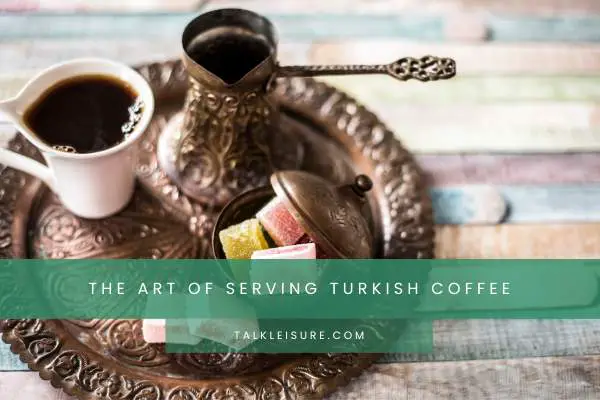Turkish coffee culture is deeply rooted in the history and tradition of Turkey.
It is not just a drink, but a way of life for the people.
The preparation and serving of Turkish coffee is a careful ritual that holds great significance.
The uniqueness of the coffee lies in its preparation, presentation, and the social interaction that it provides.
The History And Importance Of Turkish Coffee Culture

Turkish coffee has been an essential part of Turkish culture for centuries.
The coffee is an important symbol of hospitality and is often served during social gatherings and special occasions.
The tradition of serving Turkish coffee dates back to the Ottoman Empire, where the coffee was considered a sign of wealth and sophistication.
Turkish coffee was so important to the Ottoman Empire that it was even used in political negotiations and ceremonies.
How To Prepare Turkish Coffee At Home

Making Turkish coffee at home can be relatively simple, but also takes time and patience.
The key to a perfect cup of Turkish coffee is the preparation.
Here are the steps to prepare Turkish coffee at home:
- Use fresh cold water, preferably filtered or spring water.
- Measure the coffee and water ratio carefully.
The general rule is one heaping tablespoon of finely ground Turkish coffee per 3 ounces of water.
- Add the coffee and sugar (if desired) into Ibrik (a traditional Turkish coffee pot) and mix them.
- Add the water carefully, making sure not to agitate the ground coffee.
- Place the Ibrik on low heat and watch for the coffee to reach boiling temperature.
As it reaches boiling temperature, you will see a small amount of foam collecting on top of the coffee. At this point, remove the Ibrik from the heat.
- Let the coffee rest for a few seconds before returning to heat. Repeat this process two or three more times.
- Pour the coffee into small cups while holding the Ibrik with a towel.
Make sure that you divide the foam equally between the cups.
- Enjoy your delicious cup of Turkish coffee!
In conclusion, Turkish coffee culture is a valued tradition and a vital part of Turkish identity.
Preparing and serving Turkish coffee is an art form steeped in history and social significance.
With a little practice and patience, anyone can enjoy a delicious cup of Turkish coffee in the comfort of their home.
The Art Of Serving Turkish Coffee

Turkish coffee is more than just a drink. It is a cultural phenomenon steeped in history and tradition.
The art of serving Turkish coffee is an experience that involves all five senses and requires patience and attention to detail.
From the preparation to the presentation and etiquette, every aspect of serving Turkish coffee is carefully considered and executed.
Turkish Coffee Presentation And Etiquette
The presentation of Turkish coffee is just as important as its preparation.
It is typically served in a small cup with a saucer and a piece of Turkish delight.
The coffee is always served with the foam on top, and the host will ensure that each guest receives an equal amount of foam in their cup.
The cup is held by the rim or the base, never by the handle, as it is considered uncivilized to drink the coffee quickly.
Instead, the coffee is sipped slowly and savored, allowing the flavors and aroma to be fully appreciated.
There are also certain etiquette rules that should be followed when serving Turkish coffee.
For example, it is customary to offer Turkish coffee to guests as a sign of hospitality.
If a guest declines the offer, it is considered impolite to insist.
Additionally, if a guest has finished their coffee, it is customary for the host to offer them a second cup.
The guest may decline, but it is still important to make the offer.
Overall, the art of serving Turkish coffee is a cultural experience that goes far beyond the drink itself. It is a ritual that fosters social interaction and celebrates the rich history and traditions of Turkey. Whether you are a beginner or an expert, there is always something to be learned and appreciated about serving Turkish coffee.
Turkish Coffee Grinders And Beans
To make Turkish coffee, the beans need to be ground to a very fine powder.
This requires a specific type of grinder, known as a Turkish coffee grinder.
There are two main types of Turkish coffee grinders: manual and electric.
Manual Turkish coffee grinders are typically made of brass or copper and have a hand-crank mechanism.
They are small, portable, and easy to operate, making them ideal for home use.
The grinder consists of two parts: a hopper that holds the beans and a lower chamber that collects the ground coffee.
Electric Turkish coffee grinders are larger and more powerful than manual grinders.
They are designed specifically for grinding Turkish coffee and often have adjustable settings to control the fineness of the grind.
Electric grinders are preferred by commercial establishments that need to produce large quantities of coffee quickly and efficiently.
Regardless of the type of grinder used, the key characteristic of a good Turkish coffee grinder is the grinding burrs.
These are the sharp metal plates that crush the beans into powder.
High-quality grinders have burrs that are made of steel or ceramic and are capable of producing a consistent, fine grind.
When it comes to the beans used for Turkish coffee, Arabica beans are the most commonly used.
They are known for their low acidity and rich, chocolatey flavor.
Turkish coffee is usually made with a medium roast, which produces a balanced flavor profile and a smooth, velvety texture.
Traditional Turkish Coffee Houses

In Turkey, coffee has a rich cultural and historical significance dating back centuries.
Traditional Turkish coffee houses are an integral part of this history.
These establishments are more than just a place to go for a cup of coffee; they are a cultural hub where people gather to socialize, network, and discuss current events.
The atmosphere of a traditional Turkish coffee house is steeped in history and tradition.
They are typically decorated with ornate rugs, tapestries, and mozaics and often feature low tables with cushions.
The lighting is dim, and the only sounds are the soft murmur of conversation and the clinking of cups and saucers.
One unique aspect of Turkish coffee houses is that they are open to all members of society, regardless of their social standing.
This means that people from different walks of life mix and mingle, making them a great place to network and build connections.
Another essential aspect of Turkish coffee houses is the ritual of Turkish coffee preparation.
The coffee is brewed slowly in a cezve, a small copper or brass pot, over a low flame.
The process takes several minutes, and the result is a thick, foamy liquid that is poured into small cups.
Each cup is typically served with a small glass of water and a Turkish delight to cleanse the palate.
The act of drinking Turkish coffee is also part of the ritual.
The coffee is sipped slowly, allowing the flavor and aroma to be savored, and the grounds settle to the bottom of the cup.
The emptied cup is then lifted and swirled three times before being turned upside down on its saucer.
This is called fal, or fortune-telling, and the patterns formed by the grounds on the saucer are interpreted as messages from the future.
Turkish Coffee As A Social Ritual
Traditional Turkish coffee houses play a significant role in Turkey’s cultural heritage.
These establishments offer more than just a cup of coffee; they are a cultural hub where people gather to socialize, network, and discuss current events.
The atmosphere of a traditional Turkish coffee house is steeped in history and tradition.
They are typically decorated with ornate rugs, tapestries, and mosaics and feature low tables with cushions.
The lighting is dim, and the only sounds are the soft murmur of conversation and the clinking of cups and saucers.
One unique aspect of Turkish coffee houses is that they are open to everyone regardless of their social standing, making them a great place to network and build connections.
Turkish coffee is also an essential part of the social culture in Turkey. Offering a cup of Turkish coffee is a sign of hospitality and respect, and refusing it is considered impolite.
The ritual of preparing Turkish coffee is just as important as the coffee itself.
The coffee is brewed slowly in a cezve, a small copper or brass pot, over a low flame.
This process takes several minutes, and the result is a thick, foamy liquid poured into small cups.
Each cup is typically served with a small glass of water and a Turkish delight to cleanse the palate.
The act of drinking Turkish coffee is also part of the ritual. The coffee is sipped slowly, allowing the flavor and aroma to be savored, and the grounds settle to the bottom of the cup.
The Health Benefits of Turkish Coffee

When it comes to coffee, Turkish coffee is often overlooked in favor of its more popular counterparts like espresso or Americano. H
owever, Turkish coffee has a unique taste and some surprising health benefits that make it worth a try.
One of the most significant nutritional benefits of Turkish coffee is its high antioxidant content.
Antioxidants are known for their ability to reduce inflammation in the body and protect against chronic diseases like cancer, heart disease, and Alzheimer’s.
In fact, Turkish coffee has been found to have more antioxidants than both espresso and drip coffee.
Turkish coffee is also low in calories, with just a few calories per cup.
It can help to promote weight loss and aid in digestion, making it a great option for those looking to improve their overall health and well-being.
Additionally, Turkish coffee contains essential vitamins and minerals like magnesium, potassium, and niacin.
These nutrients can help to support bone health, improve cognitive function, and regulate blood pressure levels.
One thing to keep in mind is that Turkish coffee is brewed using a significant amount of ground coffee beans, which can make it higher in caffeine than other types of coffee.
However, studies have shown that consuming moderate amounts of caffeine can have beneficial effects on the body, such as improving focus, increasing metabolism, and reducing the risk of certain diseases.
Conclusion
Turkish coffee may not be the most well-known coffee variety, but it certainly has some impressive nutritional benefits.
With its high antioxidant content, low calorie count, and essential vitamins and minerals,
Turkish coffee can help support overall health and well-being.
So, the next time you want to enjoy a cup of coffee, try Turkish coffee and experience its unique flavor and cultural significance.
More Articles: The secrets behind the perfect espresso shot.












